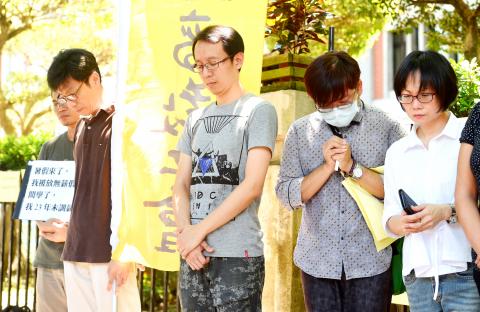Part-time lecturers working at private universities and members of the Taiwan Higher Education Union yesterday protested in front of the Ministry of Education, calling on it to promulgate rules to ensure that lecturers at private schools are paid the same hourly rates as their counterparts at public institutions.
Union director Chen Shu-han (陳書涵) said that 72 of the nation’s 110 private universities, or 67 percent, pay part-time lecturers the basic hourly rates set 23 years ago, while commodity prices have soared by 35 percent since then.
Although the Act Governing Teachers’ Salaries (教師待遇條例), which took effect this year, stipulates that teachers at public and private schools should receive the same hourly fees, many schools have ignored the law, Chen said.

Photo: Lo Pei-der, Taipei Times
Citing ministry statistics, she said that as of last year, there were more than 46,000 part-time lecturers working at private universities.
The ministry in 2014 raised hourly fees for part-time lecturers at public universities, but implemented a set of regulations saying that private institutions could set hourly rates for part-time lecturers after considering their financial conditions, Chen said.
This rule should be changed to ensure that part-time lecturers at private universities are paid the same wage for the same amount of work performed by their counterparts at public universities, she said.
Chen said the hourly pay received by full-time and part-time lecturers would be roughly equal if part-time lecturers’ hourly rates were raised by 16 percent, but many private universities have refused to do so, even though the extra spending would only constitute a small fraction of their annual revenues.
The union made a comparison between the cost of granting raises to part-time lecturers at 15 of the universities and the money the schools made in 2014.
The Oriental Institute of Technology had the widest gap, as raising the wages of its 114 part-time lecturers would have cut its NT$2.15 billion (NT$66.6 million) revenue by only 0.07 percent.
Soochow University, Chinese Culture University, Ming Chuan University, Shih Hsin University, Tamkang University and Feng Chia University were among the schools the union said did not give part-time teaching staff pay raises.
Hsu Wen-lu (徐文路), a part-time lecturer at five universities, said he earns NT$50,000 a month by teaching about 22 hours per week, but that he only gets paid nine months out of the year, during which he spends NT$14,000 for travel and rent.
The ministry said it gives importance to protecting part-time lecturers’ rights, adding that it would continue gathering opinions on the issue before drafting a solution.

Chinese Nationalist Party (KMT) Chairman Eric Chu (朱立倫), spokeswoman Yang Chih-yu (楊智伃) and Legislator Hsieh Lung-chieh (謝龍介) would be summoned by police for questioning for leading an illegal assembly on Thursday evening last week, Minister of the Interior Liu Shyh-fang (劉世芳) said today. The three KMT officials led an assembly outside the Taipei City Prosecutors’ Office, a restricted area where public assembly is not allowed, protesting the questioning of several KMT staff and searches of KMT headquarters and offices in a recall petition forgery case. Chu, Yang and Hsieh are all suspected of contravening the Assembly and Parade Act (集會遊行法) by holding

PRAISE: Japanese visitor Takashi Kubota said the Taiwanese temple architecture images showcased in the AI Art Gallery were the most impressive displays he saw Taiwan does not have an official pavilion at the World Expo in Osaka, Japan, because of its diplomatic predicament, but the government-backed Tech World pavilion is drawing interest with its unique recreations of works by Taiwanese artists. The pavilion features an artificial intelligence (AI)-based art gallery showcasing works of famous Taiwanese artists from the Japanese colonial period using innovative technologies. Among its main simulated displays are Eastern gouache paintings by Chen Chin (陳進), Lin Yu-shan (林玉山) and Kuo Hsueh-hu (郭雪湖), who were the three young Taiwanese painters selected for the East Asian Painting exhibition in 1927. Gouache is a water-based

Taiwan would welcome the return of Honduras as a diplomatic ally if its next president decides to make such a move, Minister of Foreign Affairs Lin Chia-lung (林佳龍) said yesterday. “Of course, we would welcome Honduras if they want to restore diplomatic ties with Taiwan after their elections,” Lin said at a meeting of the legislature’s Foreign Affairs and National Defense Committee, when asked to comment on statements made by two of the three Honduran presidential candidates during the presidential campaign in the Central American country. Taiwan is paying close attention to the region as a whole in the wake of a

OFF-TARGET: More than 30,000 participants were expected to take part in the Games next month, but only 6,550 foreign and 19,400 Taiwanese athletes have registered Taipei city councilors yesterday blasted the organizers of next month’s World Masters Games over sudden timetable and venue changes, which they said have caused thousands of participants to back out of the international sporting event, among other organizational issues. They also cited visa delays and political interference by China as reasons many foreign athletes are requesting refunds for the event, to be held from May 17 to 30. Jointly organized by the Taipei and New Taipei City governments, the games have been rocked by numerous controversies since preparations began in 2020. Taipei City Councilor Lin Yen-feng (林延鳳) said yesterday that new measures by